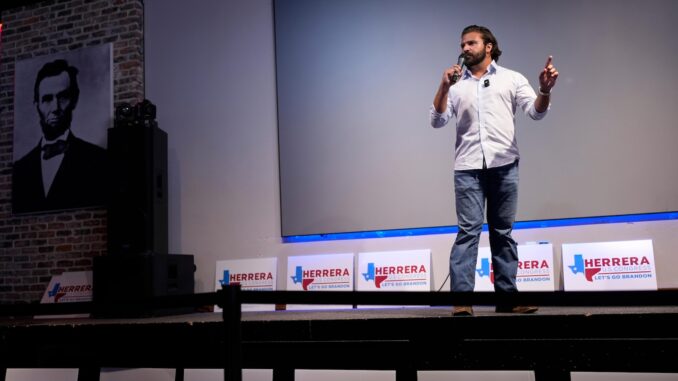
AUSTIN, Texas — Republican Texas House Speaker Dade Phelan won his primary runoff Tuesday to a survive a wave of party turbulence in America’s biggest red state, and anger from the right over last year’s impeachment of state Attorney General Ken Paxton.
Phelan, who finished second in March to challenger David Covey, a former local party chairman and oil and gas consultant who was backed by former President Donald Trump, rallied to a razor-thin victory in the runoff.
In another key Republican runoff born from a bitter split within the party, U.S. Rep. Tony Gonzalez was fighting to hold off challenger Brandon Herrera, a gun-rights YouTube creator with more than 3 million followers.
Phelan’s victory stopped a push from the hard right to force him out of his leadership role in the state’s dominant party, but a shakeup in the Texas Capitol could still lay ahead.
Although the victory keeps Phelan on the ballot in his southeast Texas district, the bruising primary fight leaves questions about his ability to retain the speakership.
At his election night party, Phelan declared victory in what he called “a terrible, awful, knockdown, drag-out” fight and told supporters he will remain speaker.
“I think this runoff did me a favor,” Phelan said. “It let my voters know what my real record is.”
The race was a snapshot of fractures within the GOP nationally. Phelan, who has been speaker since 2021, came under fire after his chamber voted last year to impeach Paxton on bribery and corruption charges. Paxton was later acquitted in the state Senate.
Phelan presided over votes that enacted some of the toughest anti-abortion laws in the country, vastly expanded gun rights, supported Gov. Greg Abbott’s highly visible anti-immigration platforms and curtailed LGBTQ+ rights.
After Phelan declared victory, Covey and Paxton accused him of attracting Democrats to vote for him in the Republican primary and push him over the top. Texas has an open primary system, meaning voters can cross party lines to vote.
“Dade Phelan may have won this election, but in doing so, he has irrevocably destroyed his already feeble legacy,” Covey said.
Here’s a look at other key primary runoffs in Texas:
Gonzales represents a sprawling district that spans some 800 miles (nearly 1,300 kilometers) of the Texas-Mexico border.
He was first elected in 2020 and easily won again in 2022, but the state Republican Party sanctioned him over a voting record that highlighted an independent streak. That included support for protecting same-sex marriage and for new gun-safety laws following the 2022 Uvalde school shooting, in his district, that left 21 people dead.
Gonzales has also clashed with some hard-right Republicans, calling them “scumbags.”
Herrera, a gun manufacturer and gun-rights activist, was second with nearly 25% of the vote in a five-way primary in March to force the runoff. Gonzales was first with 45%.
Gonzales has the support of some key Republicans who may be wary of ousting an incumbent from an ostensibly safe seat. U.S. House Speaker Mike Johnson has attended a fundraiser for Gonzales, and Gov. Greg Abbott has endorsed him. Herrera’s support on the far right has included a campaign appearance with Republican Rep. Matt Gaetz of Florida.
The winner will face Democrat Santos Limon in November.
Only one other House incumbent has been defeated this year: Republican Rep. Jerry Carl of Alabama, who lost an unusual primary to Rep. Barry Moore after the state was forced to redraw congressional districts.
Katrina Pierson, a former spokeswoman for former President Donald Trump, is up against incumbent Justin Holland for his state House seat in the Dallas suburbs.
Holland was among House Republicans who voted to impeach Paxton. He also voted to raise the age for purchasing assault rifles from 18 to 21, and voted against Abbott’s plan to spend public education money on private schools.
Severe storms that smacked the state early Tuesday particularly in the Dallas and Houston areas, left some voters struggling to get to polls and some found them closed when they did.
More than 100 polling stations in Dallas, Kaufman, Ellis and Tarrant counties were without power early in the day. Dallas County extended voting by two hours to 9 p.m., and a judge in Kaufman County, where workers set up generators at several polling stations, ordered voting to remain open until 8 p.m. Many Texas counties allow voters to vote at any open polling station.
Republicans picked Jay Furman, a retired Navy veteran, as the nominee to run in November against Henry Cuellar, a longtime Democratic congressman who along with his wife was indicted this spring on federal bribery, money laundering and fraud charges. Cuellar has said he is innocent; three associates have pleaded guilty in related investigations.
Furman defeated rancher and businessman Lazaro Garza in the South Texas district that Cuellar has held since 2005. Both campaigned on tighter border security and immigration restrictions.
There was another Cuellar on the ballot, too: Rosie Cuellar, his sister, was defeated by Cecilia Castellano in the Democratic runoff for a South Texas state House seat. The March primary was held before Henry Cuellar was indicted.
The winner advances to the November general election against Republican Don McLaughlin, who was mayor of Uvalde when the school shooting happened.
Republicans also chose real estate businessman and state House Rep. Craig Goldman over construction company businessman John O’Shea to replace outgoing U.S. Rep. Kay Granger, the nation’s longest-serving GOP congresswoman. Goldman will face Democrat Trey Hunt in the heavily-Republican district anchored in Fort Worth.
Granger, 81, was first elected in 1996 and is a former chairwoman of the powerful House Appropriations Committee. She announced last year she would not seek re-election.


Be the first to comment